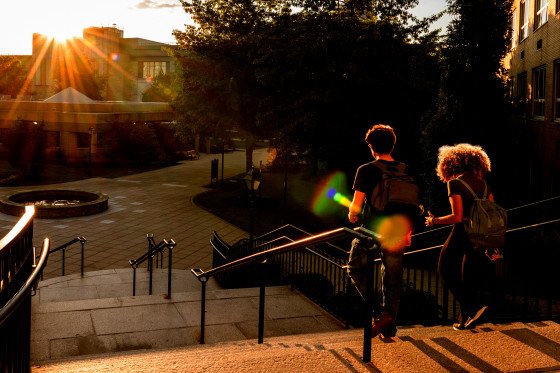Millions of students are returning to college campuses around the country. On today’s episode of Dateline: True Crime Weekly, Andrea Canning talks to NBC Senior Investigative Correspondent Vicky Nguyen, who has gathered some tips for the best way to stay safe, from dorm rooms to being alone on campus in the middle of the night.
You can listen to the full episode now, for free.
Plus, read a transcript of their exchange below:
Andrea Canning: Okay. It is that time of year when millions of college students across the country are settling into campus life, some of them for the first time. You’ve probably seen stories on Dateline about students who’ve been the victims of hazing, stalking, even murder. Thankfully, government data shows that kind of incident on campus is rare. Still it can be hard for a parent not to worry, so this week on Dateline Defense, we’ve invited NBC Senior Investigative correspondent Vicky Nguyen to share her safety tips. Hi Vicky.
Vicky Nguyen: Hey Andrea. Great to be with you.
Canning: Yeah, thank you for doing this. I feel like, okay, so I’m sort of on the verge, like, in a few years of kids going off to college and I can only imagine, you know, the worries that parents, um, must have, right?
Nguyen: I’m with you, Andrea. I’ve got a kid, maybe three years out from going off to campus for the first time, and here’s the thing maybe your child has been independent before — gone to a camp or two, college is a whole ‘nother ball of wax. It’s, It’s the first time you’re going to really experience freedom and safety is sometimes not a priority for our students. So let’s start with dorm rooms, right? Keep your doors locked. Don’t prop them open, especially at night or leave the door to the building open. You don’t know who’s on that campus. So always make sure you watch out behind you. Don’t allow tailgaters. This is something I think you gotta talk to your kids about that. It’s okay to be rude if it’s in the name of safety, like, ‘Hey, sorry, you’re gonna need to scan your ID.’ The other thing sometimes people don’t think about on the ground floor is just making sure you have adequate window coverings and that people aren’t able to see into your dorm room window when, you know, they’re walking around or at night.
Canning: Good point.
Nguyen: And we know everybody wants to decorate their dorm room and make it personalized. Don’t cover the peephole. You always want to look and see who’s knocking on that door before you open it.
Canning: Let’s talk about nighttime on campus because, maybe you’re studying late. Maybe you’re coming home from a party. Um, what should students do if they find themselves on campus at night?
Nguyen: So a couple of things. Staying vigilant, keeping your senses about you, making sure that you don’t do anything-- overdrink or, or partake in too many extracurricular activities, drugs, what have you, and having a buddy is so important. Going out with a group and making sure people know where you are or when you’re coming home. Something else I want people to do is program your campus police phone number into your phone. Make it a favorite. Some of the safety experts tell us actually you should call campus police first before you call 911 in a situation.
Canning: Cause they’re quicker. They’re there.
Nguyen: Exactly. They’re there. Take advantage also of like, the safe ride or the busing systems. You know, campus police will often offer escorts at all hours of the night to make sure you get from point A to point B safely.
Canning: Yeah. And I think it’s like, don’t be embarrassed, you know, to call campus police. ‘Cause I think a lot of people would be like, ‘Oh, I don’t wanna bother them, or I’m overreacting.’ Don’t… Just do it.
Nguyen: You’re so right. You’re not bothering anyone. Your safety is a priority.
Canning: So a lot of campuses now, you get alerts from the college if there’s a safety issue, but you have to make sure you sign up for these because they’re not just going to come to your phone like an Amber alert.
Nguyen: That’s right. Almost every campus nowadays has a campus wide alert system. And they will send an alert directly to your phone. If there’s any kind of a situation, a lockdown, you know, an active shooter situation. But make sure that it’s on so that you can receive those notifications. And also, in a case of an emergency, if you’re in a classroom, in a lecture hall, follow your professor’s instructions because your faculty, they are trained on how to lock doors, how to barricade doors, how to make sure that they, um, react in an emergency. And you know what? These days, it’s important to keep a portable phone charger on you. Because you don’t want your phone to die, you might miss out on important information that way.
Canning: Those were excellent tips. Thank you so much, and I hope that all of our parents and students, um, are really taking this to heart.
Nguyen: Totally. We want people to be not scared, but be safe and be prepared.
